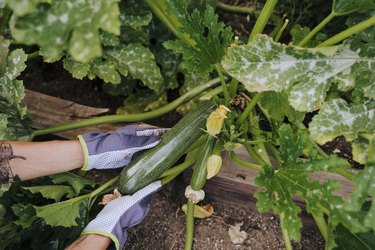
Summer squashes, like zucchini (Cucurbita pepo var. cylindrica), are popular kitchen garden plants because they grow quickly and can be enjoyed raw, steamed or grilled. Zucchini can even be baked into bread. Zucchini is an annual vine in U.S. Department of Agriculture plant hardiness zones 2 to 11, and it needs plenty of water to produce fruit.
Growing Zucchini Vine Crops
Video of the Day
Zucchini is an easy vegetable to grow from seed, and it can typically be harvested after just 50 days. If you live in a cool northern region, start zucchini seeds indoors in the spring a few weeks before the last frost. Transplant them into your garden when the threat of frost has passed, and temperatures are over 65 degrees Fahrenheit. You can also sow the seeds directly into the soil at this point, though you will have to wait a little longer for your zucchini to be ready.
Video of the Day
Vine crops, like zucchini, perform best in soil that is slightly acidic with a pH between 6.0 and 6.5. Well-fertilized soil is a must for zucchini, which is a heavy-feeding plant. Amending the soil with compost is usually enough. However, if the soil is not rich, you can apply an organic liquid fertilizer every two to three weeks. Be careful with nitrogen fertilizers, though, as these can stimulate leaf growth but will not improve yield. Make sure your zucchini vines receive six to 10 hours of sunlight a day for best results.
How to Water Zucchini
Zucchini needs moisture to thrive – at least 2 inches of water a week – and perhaps even more during dry and hot weather. You should not let the soil dry out completely between waterings, though the soil should not be waterlogged either. Watering zucchini plants thoroughly is especially crucial when they are flowering and when the fruit is developing. Fortunately, squash plants have a long taproot that allows them to extract moisture from deep in the ground.
Avoid watering zucchini plants from overhead, as water that splashes up from the soil to the leaves can transmit diseases and can lead to the development of powdery mildew, which is caused by a fungus. A soaker hose is therefore the way to go. Applying organic mulch around your zucchini plants will help to keep the soil moist. If you have trained your zucchini vines upright on a trellis, you may need to water them more often.
Tips for Harvesting Zucchini
Summer squashes, like zucchini, are harvested when the fruit is immature, and the seeds have not yet hardened. As a general rule, the smaller the fruit, the more tender it will be. If a fruit has a length of 8 inches, it is ready to be harvested.
If you wait too long to harvest zucchini, the rind becomes tough, and the overall quality declines. Harvesting zucchini encourages the plant to produce more fruit, which is a good reason not to leave the zucchini on the plant any longer than necessary. Never harvest any part of the zucchini plant when it is wet, as this can spread disease.